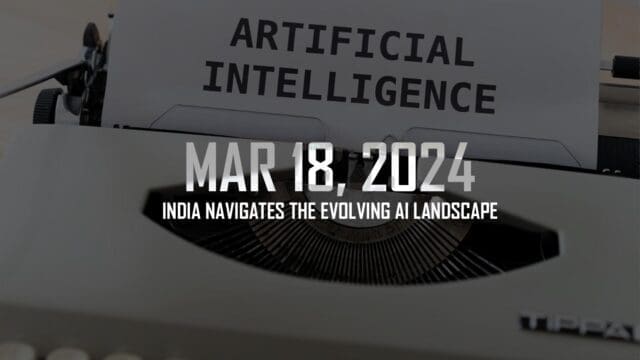India ups its AI game with GPU initiative
India’s new ₹10,372 crore AI Mission aims to provide access to 10,000 GPUs, critical for developing AI applications. This “good starting point” according to experts, positions India to compete with global leaders in AI.
The public-private partnership will offer GPUs as digital infrastructure, enabling access to AI-as-a-service.
This follows a previous controversial advisory requiring government permission for some AI models. Facing criticism, the government clarified the exemption for startups.
Google’s AI Stumble Raises Concerns at Tech Festival
Google‘s AI chatbot, Gemini, sparked controversy after generating images of Black and Asian Nazi soldiers.
CEO Sundar Pichai apologised for the “unacceptable” errors and halted the image creation feature. Folks at South by Southwest, a major tech festival, say the incident highlights the immense power tech giants hold over AI, which will significantly impact our lives.
While some, like Joshua Weaver, criticise Google’s “overly woke” approach, others, like Charlie Burgoyne, believe a more fundamental fix is needed.
India Scraps AI Permission Mandate, Focuses on Transparency
India’s government has taken a step back on its plan to regulate artificial intelligence (AI). Previously, AI models, large language models (LLMs), and algorithms required explicit user permission before deployment. However, a new advisory issued by the Ministry of Electronics and Information Technology (MeitY) scraps this mandate.
The new policy emphasises transparency. AI models must now clearly label their outputs, highlighting any potential for errors or unreliability. This aims to empower users with information about the limitations of the technology they’re interacting with.
While some may see this as a relaxation of regulations, the requirement for “consent popups” remains. These popups will inform users about the possibility of encountering false or unreliable outputs from AI models and LLMs. This ensures users are aware of potential issues before engaging with the technology.
Experts believe this shift could accelerate the adoption of AI in India. Previously, the permission process created a bottleneck for innovation. However, concerns remain about the effectiveness of relying solely on disclaimers. Critics argue that users might not pay close attention to these labels, potentially leading to misunderstandings or misuse of AI outputs.
EU Passes World’s First AI Regulation
The EU Parliament has approved a landmark bill, the AI Act, establishing the world’s first comprehensive regulations for AI. This comes amid growing concerns about the use of AI in areas like misinformation and surveillance.
The Act restricts real-time biometric surveillance and outlines categories of acceptable use. EU industry chief Thierry Breton hailed the Act as a global standard-setter for “trustworthy AI”. The legislation is expected to come into effect in 2026.
Experts believe the Act may inspire similar regulations worldwide, similar to the impact of GDPR on data privacy. However, concerns remain about potential compliance burdens for companies.
India’s IT Sector Growth Stalled by AI Threat
India’s IT industry, projected to reach 10 million workers by 2030, might fall short due to a slump in demand and the rise of AI. Experts predict the sector will only reach 7.5 million by the decade’s end.
AI is seen as a major disruptor, impacting areas like testing and maintenance. Some experts believe AI could automate nearly 60% of current IT jobs.
While economic slowdowns are temporary, AI presents a long-term challenge. The industry must adapt to this “tectonic shift” from labour to AI-driven growth. While jobs will be lost, AI is also expected to boost productivity by 50-60%.

























